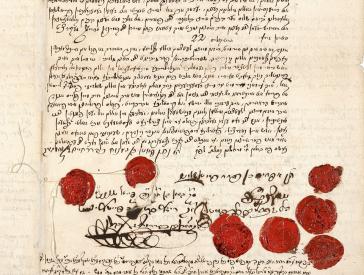
Reading Room
Opening Hours, Equipment, and Other Information
The Reading Room for our Library and our Archive is located in the W. Michael Blumenthal Academy of the Jewish Museum Berlin, opposite the museum.
Opening Hours
| Mon & Tue | 10 am–5 pm |
| Wed–Fri | 12 noon–5 pm |
Closing Days
The reading room is closed on the following days:

Where
W. M. Blumenthal Academy, Reading Room
Fromet-und-Moses-Mendelssohn-Platz 1, 10969 Berlin
Postal address: Lindenstraße 9-14, 10969 Berlin
The use of archive and/or library material is possible. Please register via the following web form:
Online Catalogs
To find out which books, magazines, documents and other media you may view in the Reading Room, you can search or browse our Online Library Catalog.
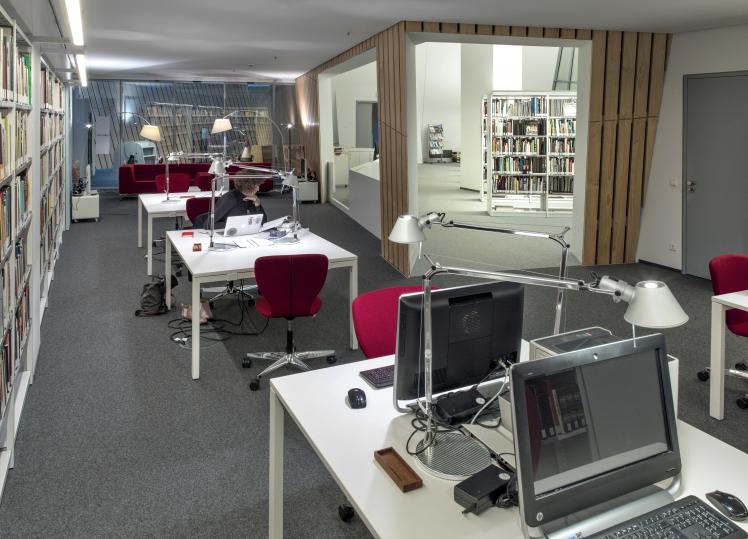
Workstations in the reading room of the archive and library; Jewish Museum Berlin, photo: Roman März
You can also find some of the holdings of the Leo Baeck Institute (search “Our Catalog” on www.lbi.org) and the Wiener Library (www.wienerlibrary.co.uk/Collections) on our premises. Each item’s entry indicates whether it is also available on microfilm in our Reading Room.
The Public Stacks and Ordering
from the Depot
Our library’s public stacks, with over 20,000 books, are accessible to the public. Holdings whose “Location” in their library catalog entry is listed as Rare Book Library, Rare Book Depot, or Depot must be ordered in advance.
Please register by e-mail and let us know your preferred date and order preferences.
The Archive staff is happy to provide information on the holdings in its collection, which include bequests from nearly 1,700 individuals. Please contact the Archive staff to inquire about orders from the archival holdings. On our website, you will find more information about our Archive and the branches of the Leo Baeck Institute and the Wiener Library located there.
Contact
Reading Room
T +49 (0)30 259 93 560
bibliothek@jmberlin.de
Archive
T +49 (0)30 259 93 318
archive@jmberlin.de
Technical Equipment and Databases
The Reading Room has a media station for DVDs and videos, two reader printers for microfilm and microfiche, and a book scanner. At the computer workstations, you can conduct research in digital reference sources, magazines, databases such as the Encyclopedia Judaica.
Both institutions and private individuals can sign up for databases covered by the national license of the German Research Foundation (DFG). This license gives you access in the Reading Room to:
Additional full-text databases have open online access. We have compiled various recommended links for you on our website, including lists of digitized magazines and other online resources for researching Jewish topics.
How can I conduct research using the museum’s archive, collections, and library?
Our Reading Room is open to the public. You can also research using our library’s holdings and some of our collection’s holdings online. To view additional holdings, please contact the responsible curators.
Can I borrow books from the library?
We do not lend books. Our holdings can only be viewed in the Reading Room.
Can the museum help me research my family history?
You may use our in-house holdings for research purposes. We have also compiled a directory of links to research opportunities for personal and family research and genealogy.
Is there WiFi Internet access at the museum?
In the museum, you can use a hotspot provided by Deutsche Telekom.
How can I reach the museum by public transportation?
The museum is easy to reach by subway (U1, U3, U6 U-Bahn lines) and by bus (M29, M41, 248).
Are there places to park near the museum?
There are places to park in the neighborhood of the museum, but we recommend taking public transportation.
Where are disabled parking spaces located?
If you arrive by car and have a disabled parking permit (“Blue Badges”), you can use one of two parking spaces located close to the museum.
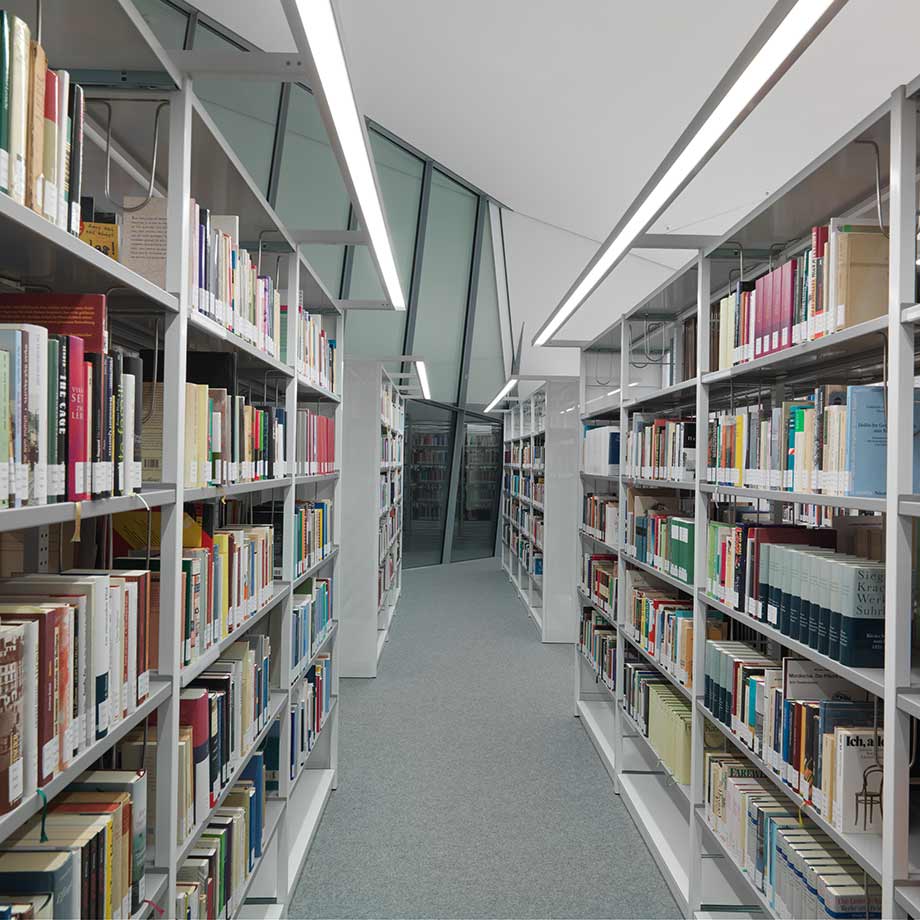
The Library of the Jewish Museum Berlin
- Landing Page
- Our Library: Books, films, and more about Jewish art, culture, and history
- Library Catalog (OPAC)
- Our Collections: collection fields at a glance
- Information for Visitors
- Current page: Reading Room: Opening hours, catalogs, databases, requesting archive material
- Registration Form: Register to view rare holdings from our library and documents from our archive
- Terms of Use: Requirements for visitors to the archive and library of the Jewish Museum Berlin
- Our Library’s Classification Scheme: The focuses and thematic areas according to which our collection is organized and grouped
- List of Fees: Prices and rates for services at the reading room of our library and archive
- Collections and Projects
- Collections on Jewish Art and Culture: Volumes printed by the Soncino Society, the publications of the Centralverein, Hebrew Printing, and special collections on Jewish art and visual culture
- The Artur Brauner Collection: Twenty-one films by the successful film producer
- Digitizing Book Holdings: Publications of the Soncino Society of Friends of the Jewish Book, 2016
- Enlarging and Indexing Our Holdings in Jewish Art: DFG Project on visual and material culture of Judaism, 2013–2018
- Digital Content
- Highlights from the Library Collection: A medieval manuscript, a cookbook from 1900, an elaborate Hebrew children’s book and other treasures
- Digital Books: A complete list of our digitized books (in German)
- Rare Digital Books: Curated selection of valuable digitized material from our holdings
- Story Time in Our Library: Why Noah Chose the Dove by Isaac Bashevis Singer, 2023
- “Hörmahl:” A Feast for the Ears: Podcast series about Rahel Varnhagen, Lina Morgenstern and other women writers, 2021–2022, in German
- See also
- Judaica Portal: Online database of Judaica holdings at various institutions, including our library’s holdings
- Periodicals in the ZDB: Research tool for magazines, newspapers, and databases in German and Austrian libraries
- Deutsche Digitale Bibliothek (DDB): Our digitized publications accessible via the DDB
- AG Jüdische Sammlungen: Website of the Jewish Collections working group (in German)
- Library Holdings: Search engine for our online collections (in German)
- Literature
- Literature for Children and Young Adults


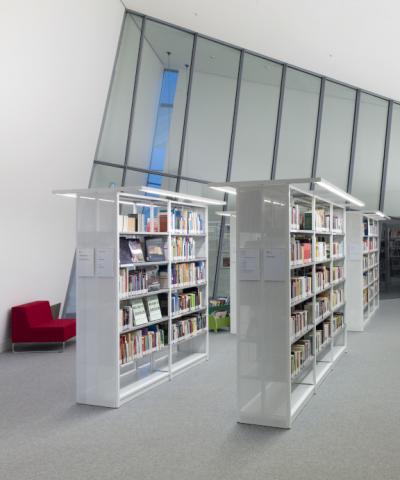
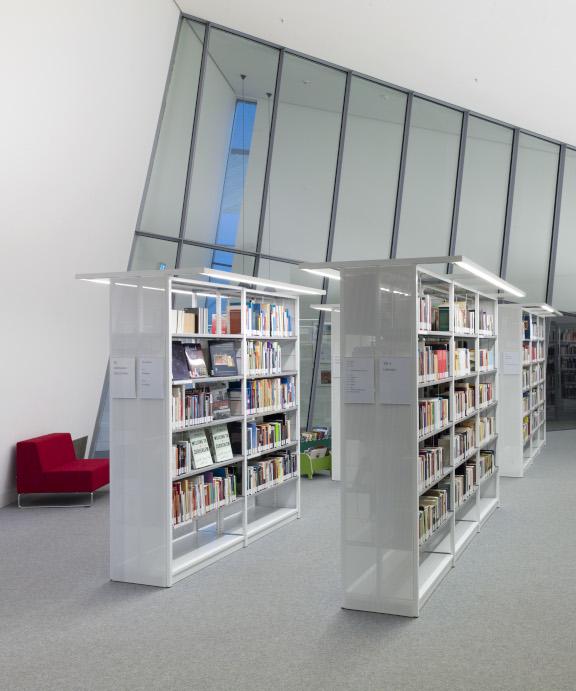 X
X
